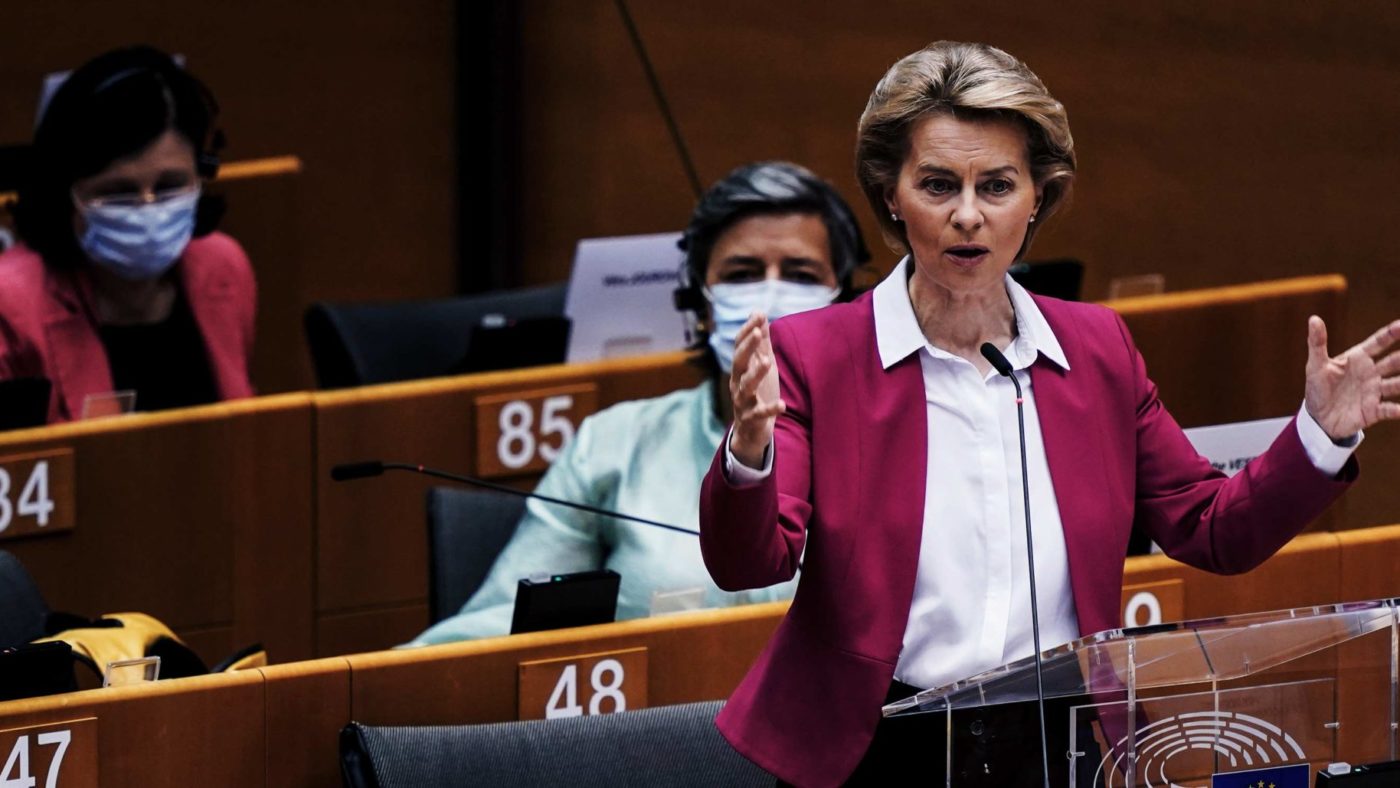When Angela Merkel and Emmanuel Macron presented their roadmap for Europe’s post-Covid economic recovery last week, many were caught off guard.
The German government, usually so sceptical of grand economic schemes – particularly if they don’t involve some promise of fiscal responsibility – suddenly agreed that a €500 billion Recovery Fund, including indirect debt collectivisation, was the way to get Europe out of its lockdown slump. Some even mused that Merkel had finally, after many years in opposition to more spendthrift member states, caved in.
Yesterday, the European Commission presented its own plans for a Recovery Fund – one even worse than the Franco-German proposal. Perhaps mindful of how underwhelming her presidency has been so far, Ursula von der Leyen announced that the fund would total not a mere €500bn but €750bn. Of course, this money won’t feature in the €1.1tn already slated in the normal seven-year EU budget. Instead the Commission will raise the extra dosh from the financial markets – the EU will be borrowing as the EU.
The big question over the original Macron-Merkel masterplan was whether the money would be handed out to member states as loans or grants. Since it is a ‘Corona Fund’, the countries worst hit by the virus – especially Spain and Italy – would get the most money. Indeed, Italy would receive €173 billion and Spain €140 billion.
In an appeal for European “solidarity” – one of those buzzwords the EU loves to throw around – the Spaniards and Italians, along with France and others, argued it would be impossible for them to pay all that money back themselves. Instead, a sizeable chunk would be distributed through grants that would ultimately be paid back by someone else. That repayment period is set from 2028 to 2058, so future generations can look forward to bearing the costs of today’s misguided virus policies for many years to come. For a continent already in the throes of fiscal anguish, this will only exacerbate an already dire debt situation.
Or perhaps it’s not. For the Commission claims to have have found an ingenious – or perhaps ingenuous – way of paying for all this. For decades, Brussels has been trying to get its “own resources,” i.e. EU-levied taxes. So far, member states have rightly refused to give up this power, correctly assuming that once the EU started levying taxes, what remaining sovereignty national governments still have would be even more curtailed. And, given the opportunity to start taxing EU citizens, does anyone really imagine Brussels would let go of that power?
The pandemic, however, offered a fresh opportunity to challenge this scepticism. The Commission certainly seems to think so, given that it has proposed not one, but four new taxes to be raised centrally by Brussels. The Emissions Trading System would be expanded to generate €10 billion annually, while a carbon border tax would bring in anything from €5bn to €14bn a year. Even more disturbingly, we now see a new push for a Europe-wide Digital Tax (already introduced in some member states). The final new proposal, perhaps the most startlingly irrational, is for a tax on “companies that draw huge benefits from the single market” – i.e., successful companies.
There are, needless to say, quite a few contradictions here. EU governments are bailing out airlines at the moment, yet the Commission would increase the tax burden for airlines through a more expansive Emissions Trading System. The EU has been calling for an industrial strategy to prop up big corporations and create “European champions,” yet they want to tax precisely companies that are doing a good job. The EU wants to help businesses and consumers off-the-ground after months of lockdowns, but they want to increase the burden both on businesses and consumers through the digital tax, which will inevitably be passed on to internet users.
The cynicism with which the federalists are using this crisis to push previously unpopular ideas – all under the cloak of ‘solidarity’ and warm words about the ‘European project’ – is remarkable. Just look at all the ideas that are cropping up in the new Recovery Fund proposals., of which “own resources” are merely the tip of the iceberg.
Take the Green New Deal, which the Commission now insists will be a central plank of post-Corona economic policy, with every penny linked to the ‘green transition’ (though strangely enough, it would still be possible to use funding to subsidise fossil fuels). So while there is clear conditionality when it comes to environmental goals, no such restraints exist when it comes to fiscal and economic policy, presumably for fear that some member states will kick up a fuss about implementing certain long-overdue reforms in return for money.
The good news is that, so far, nothing has yet been decided. The ‘frugal four’ of the Netherlands, Austria, Denmark, and Sweden have voiced some scepticism and will discuss their approach in the coming days. Let’s hope they pour cold water on von der Leyen’s plans.
Make no mistake – if passed, the Recovery Fund would be almost diametrically opposed to what Europe actually needs, which is smaller government, fewer taxes, less regulations, more innovation, entrepreneurial endeavour and a more dynamic economy. Then again, when has Brussels ever been about scaling back its own influence? With a Commission seeing chances left, right and centre to expand its writ and inflate its budget, the chances of a real market-led recovery look slimmer by the day.
Click here to subscribe to our daily briefing – the best pieces from CapX and across the web.
CapX depends on the generosity of its readers. If you value what we do, please consider making a donation.


